Want to make sure your company maximizes sales while saving time on bookkeeping? In today’s competitive marketplace, you can’t manage retail sales with a cash drawer alone. Even small retail businesses need quality point-of-sale or POS software.

You’re in the right place if you’re a business owner looking to streamline operations with a POS app. Here we explore options for the best POS system for retail.
How to Select the Best POS System for Your Retail Business
There’s no one-size-fits-all with retail POS systems since it’s nearly impossible to meet the needs of all businesses with the same type of software. The best options provide a range of benefits to support your business, such as:
- Increasing customer base and income
- Improving the checkout experience
- Providing complete awareness of purchases and sales in real-time.
- Inventory tracking
- Boosting customer loyalty (some platforms even include additional loyalty program functionalities so you can build your own customer loyalty program.)
- Making it easier to see best-selling products or services across customer groups.
When to Scale up Your POS System
If your retail POS software isn’t doing all this for you, it may be time to scale up.
Many retailers invest in a POS with accounting software when they’re small. Over time, it may be difficult to see that you’ve outgrown it. It is time to update your retail POS system if it:
- Has outdated features
- Doesn’t offer all of the integrations that you need, such as accounting software and customer relationship management.
- Lacks support for proper inventory management (i.e., it can’t track your entire inventory or lacks the inventory tools you need)
- Doesn’t give you up-to-date reports
- Is missing other features you need to grow
What Should You Look for in a POS System for Your Retail Business?
If you don’t know what’s available, you won’t know what to look for. Many POS systems offer more than you may realize. The best retail POS system not only improves sales but also improves many aspects of the customer experience. Key features include:
Track Sales
The most important feature of a retail POS system is sales tracking. Most modern systems are cloud-based, so you can see what’s happening with sales in real-time, whether from online ordering or in-person sales.
A retail POS system helps you track your customers’ preferences in several ways, which helps manage customer loyalty programs.
If you don’t already have a great loyalty system, it is well worth considering one. Loyalty programs can build customer lifetime value to support growth for years.
The best retail POS systems integrate your customizable loyalty program with your sales platform. The integration allows for a more personalized shopping experience with customized messaging, special offers, and ads.
Manage Inventory
In retail, adequate inventory management is crucial. Integrating inventory with POS data ensures you know what’s available at any given time. It should work with the type of items you sell in your product catalog and make it easy to manage products with item keywords.
Quality POS software alerts you to shortages, allowing fast restocking and preventing over-purchasing. Some systems allow you to automatically reorder when inventory hits a certain threshold, to prevent stockouts.
Many systems also alert you when products are in high demand and when products fall out of favor, with item-level reporting.
Reduce the Need for Manpower
Business software aims to automate processes to devote manpower to more value-added tasks, and retail POS software is no different.
Using automation where possible ensures that you can run your business with less manpower and dedicates your available manpower to tasks only they can handle. The more that you can integrate, the better.
You can automate everything from supplier goods, current discounts and coupons, and income per customer. Connecting software to barcode scanners for easy inventory receiving saves time and effort, too.
Some systems can even organize financial data for you, saving time on your taxes and annual bookkeeping tasks.
Customer Management and Customization
Your POS system helps to gather and use data to improve customer relationships. You can base discounts, rewards, and loyalty points on individual customer interactions, rather than mass offers.
If you’ve had trouble with customer loyalty program management before, automating it with your POS software removes the hassle of customer management. The ideal platform not only has powerful tracking capabilities, but also offers a range of engagement tools to help you attract buyers through loyalty programs, and keep in touch with them.
Better yet, quality POS platforms provide excellent customer advertising options. Your POS system can offer targeted ads during checkout including individualized coupons from a receipt printer. This can increase impulse buying to boost profit from each sale.
Usage Customization
If you’ve got a brick-and-mortar store in addition to your ecommerce website, or you’re growing quickly, you may want flexibility in your usage.
Stores that do almost all their checkouts at a counter may want big, easy-to-use, and clear displays to make transactions easier for cashiers and customers.
Stores that sell from various locations may want a handheld tablet system. Ecommerce businesses will have entirely different needs from their retail POS system. They may not need at all for cash payments but need highly tuned inventory management.
Regardless of the business model, businesses need to be able to accept multiple forms of payment – from debit cards and credit cards to digital wallets and other contactless payment options, and other custom payment types.
What Are the Benefits of a POS System Integration?
Few retailers handle all operations from a brick-and-mortar store, so a single POS hardware setup won’t be enough. Even if you get most of your sales from a physical location, you likely have some ecommerce involved.
That’s why it’s so important to integrate your POS systems with your website. Integration with your ecommerce platform is essential and offers many benefits:
- Avoid overselling. Ecommerce integration that monitors sales across physical locations and online transactions ensures you don’t oversell items. You’ll be able to quickly replenish stock as needed.
- Informative customer reports. You’ll get the same customer data whether a shopper visits your physical or online store. With a better view of overall customer data, you’ll be able to further personalize marketing campaigns.
- Customized offers. By learning about your customers both at your brick-and-mortar locations and online with dynamic customer tracking, you can offer customized promotions based on their purchases across the board.
How Do You Integrate a POS System With Your Website?
Quality POS solutions integrate well with your website, but it’s important to find one designed for both ecommerce and brick-and-mortar locations. Some systems have more complex integration requirements.
Systems that use POS hardware may be harder to integrate with your website compared to cloud-based options. There are many hardware specifications available, but for ecommerce businesses, you don’t necessarily need any hardware. Before investing in any POS system, be sure to research how to integrate it. This way, you can ensure it works with your website credit card processing, data collection, and sales.
What Should You Consider When Choosing a POS System to Integrate With Your Website?
The crucial part of integrating your POS system with your ecommerce website is ensuring they are compatible. Not all systems work interchangeably. If you have an ecommerce platform from the same maker as a POS system, such as Shopify, POS integration is likely to go more smoothly.
How Should You Choose a POS System for Your Ecommerce Business?
The best point-of-sale solution for your company depends on exactly what kind of retail you operate in.
Ecommerce retail businesses may have different needs than other types of retail. If your business operates in brick-and-mortar locations and online on an ecommerce platform, you will still have different needs. A great POS system for managing your retail is one of the most essential tools for a successful ecommerce business. Here are some features to look for:
Platform Integration
Your POS system needs to integrate smoothly with your ecommerce platform. The best ecommerce platforms offer features and data that can be extremely useful for making data-driven business decisions.
Integration with your Fulfillment Provider
However your order is fulfilled, your POS system must be able to automatically communicate with the provider when an order is received and dispatched to the customer. If your fulfillment provider doesn’t support your POS integration, learn what a great ecommerce fulfillment center should offer and make a change. Your fulfillment provider should work smoothly with your POS system to reduce the manpower you need to manage your store.
Best POS System for Ecommerce
Shopify POS
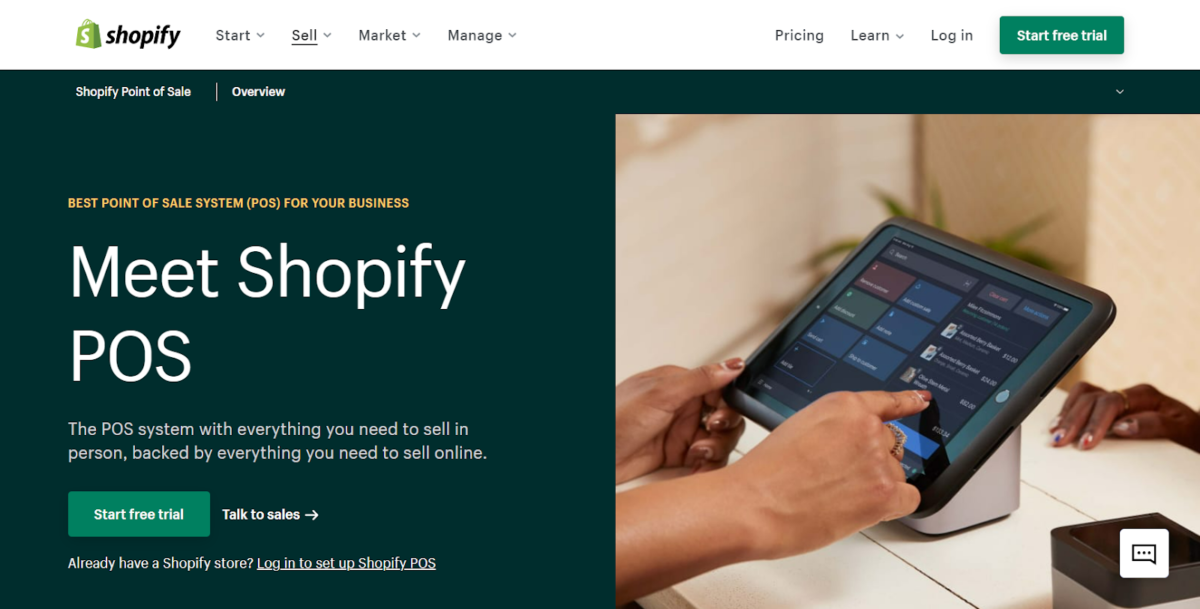
Shopify POS is a powerful platform for ecommerce, so it makes perfect sense that their point-of-sale system would be a great option for ecommerce as well. If you want a powerful data collection and sale transaction system for your ecommerce site, Shopify probably has you covered.
It comes at a reasonable price, making it a great option for sites just getting started. It works effortlessly with the Shopify platform. If you want to ensure that your POS system functionalities work perfectly and integrate with your website, this might be the way to go.
Spotify is one of the best options for any kind of retail that conducts most of its business online. Because an app is also available, it is useful for businesses that are primarily ecommerce but have an occasional in-person presence at shows or fairs. You can use it with or without a mobile reader to process payments.
Advanced reporting features make it easy to keep track of how well you’re performing across multiple sales channels.
Based on the ecommerce plan, you’ll pay 2.4%–2.7% per transaction. There’s a tech support team on standby to help you get set up if needed.
Shopify Pros
- Superb integration between your ecommerce platform and website.
- App access is available to accept customer payments in-person.
- Accept partial payments, store credit, gift cards, and split tenders; easily process refunds.
- Incredibly easy to use with excellent customer support.
- 14-day free trial available
- Affordable card processing costs make running costs more management
- Easy hardware installation
Shopify Cons
- It may cost you to grow with Shopify since advanced features come on the most expensive plans
- Reports and analytics may not be as thorough as other options, making it harder to obtain valuable insights from them.
- Limited checkout management options
Lightspeed HQ
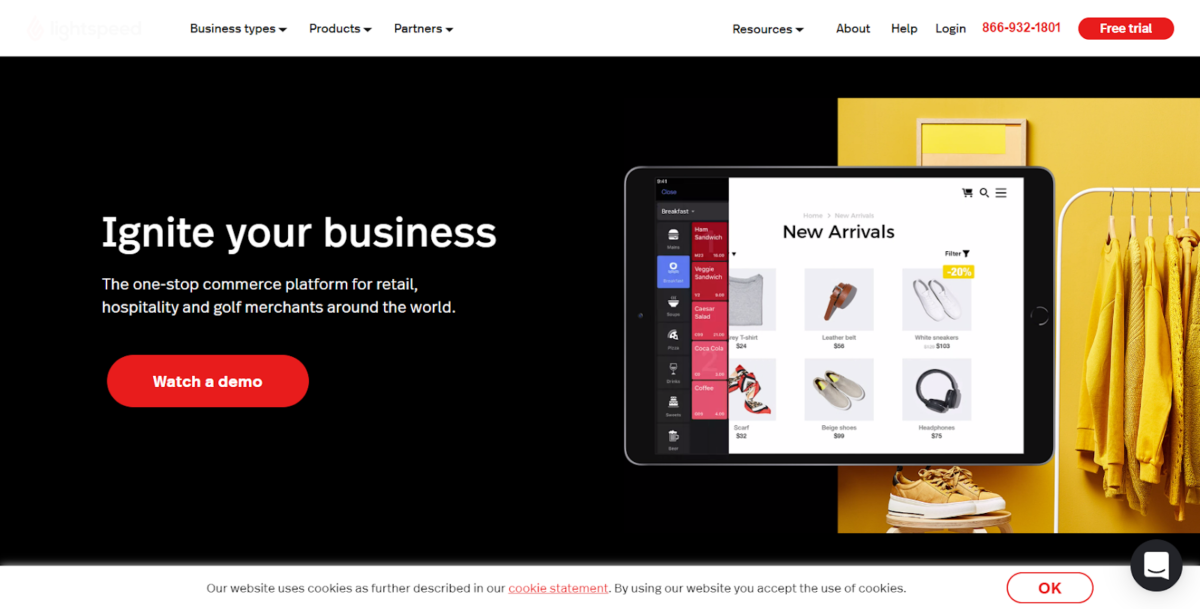
Lightspeed HQ is a powerful option for ecommerce since it offers a distinct product specifically for ecommerce business owners. It also offers an option for retail, restaurants, and coffee shops. Developing three separate products seems to have kept Lightspeed from putting as much effort into its user interface as some other programs. However, once you get used to the sometimes awkward dashboard, you may find that this program has everything your business needs.
Prices are reasonable and are charged monthly. Lightspeed aims to give you the tools you need to compete with much larger ecommerce businesses, so if you’re looking to support fast growth, this may be ideal.
Lightspeed Retail Pros
- Customized program for ecommerce so you can compete with much larger companies.
- Detailed reporting and analytics tool, integration, and standard POS tools with in-person payments.
- In-house payment processor LightSpeed Payments for card payment processing.
- Reasonable monthly pricing.
Lightspeed Retail Cons
- Must integrate with a credit card processing service to accept payments and issue refunds.
- The clunky interface can be difficult to use, especially if new people need to use it frequently.
Heartland
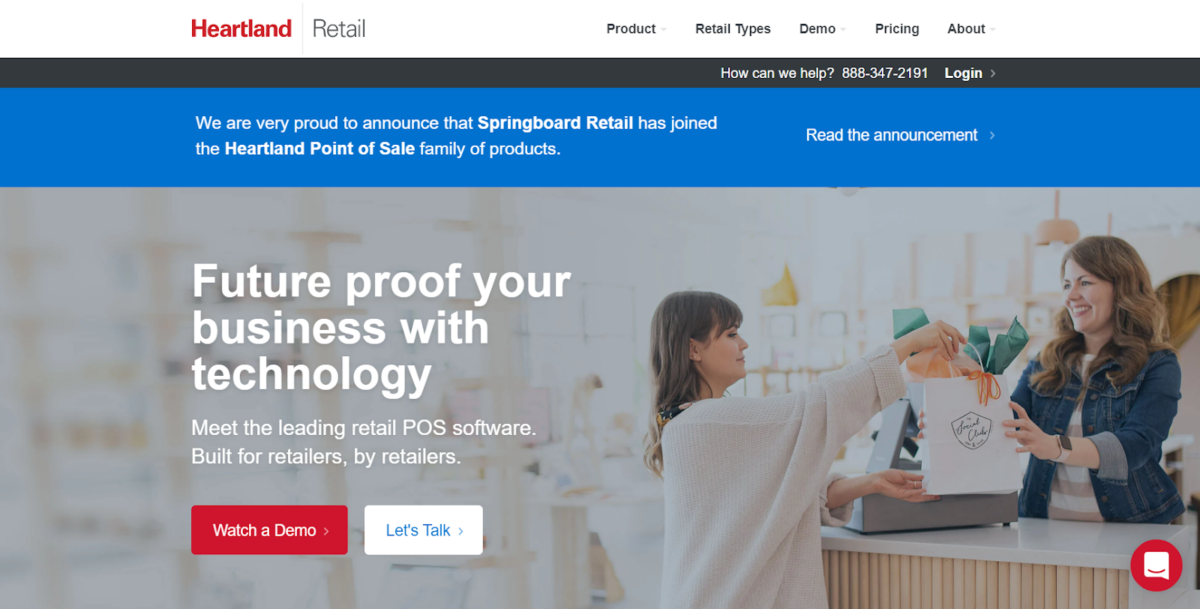
Heartland is a very powerful option for ecommerce, as well as other retail businesses. Take contactless payment easily through your ecommerce platform using a secure integrated payment processing service through Heartland. You can integrate with Shopify, WordPress, Woocommerce, and many more.
Heartland also supports mail and phone orders with keyed-in payments with a computer and virtual terminal. It offers additional services like gift cards and mobile payments, too. Heartland is a feature-rich option for many retail stores but may be especially convenient for ecommerce. Heartland also makes micropayment processing a breeze.
Heartland Pros
- Powerful system for ecommerce that enables credit card, gift card, and micro-payment processing.
- Wide range of features with support for gift cards, payroll, and even business loans.
- Industry-specific solutions for several different areas.
Heartland Cons
- Far from one of the most affordable options on the market
- Payment is not upfront or straightforward
- Higher rates for monthly payment, otherwise you’re into a three-year contract, which may increase running costs
How Should You Choose a POS System for Your Brick-and-Mortar Retail Business?
Brick-and-mortar retail may not serve the vast majority of retail needs like it used to, but brick-and-mortar stores are still a tremendously significant way to sell your products. However, you’re missing out on an opportunity if you are not updating your brick-and-mortar store with changing technology.
A quality POS system is one of the best ways to automate your brick-and-mortar store, from inventory tracking to automated checkout, to keep operations running smoothly. Here are a few things to look for in the best retail POS systems for physical stores:
- Cash management. Some types of retail, especially ecommerce, have largely moved away from dealing in cash. Some systems may not need the robust cash management system that brick-and-mortar retail requires. Compare pricing so you ensure you have fair operating costs.
- Precise inventory management. You likely don’t have access to a large warehouse to keep inventory on hand. Precise retail management tells you how much product you have available at any time, making reordering easier and preventing stockouts.
- An easy-to-use physical interface. Whether your business does most of its checkouts at a cash register or through smart devices, you need a POS system that offers an easy-to-use interface.
Best POS System for Brick-and-Mortar
LightSpeed, Formerly, ShopKeep
If you are looking for a powerful option for retail businesses, especially those that often have part-time or temporary help, ShopKeep may be the system for you. Because more affordable options are available, it’s not the ideal solution for small startups. However, this is a feature-packed option if you need to manage up to 20 locations.
ShopKeep uses tablets and an extremely easy-to-use interface for employees. The program includes unlimited inventory and employee management. Many add-ons are available to build the best solution for your needs, including hardware protection, gift cards, and social media management.
You can sync with QuickBooks to manage finances and use Bigcommerce for ecommerce management. Each of these add-ons comes at an additional cost, so consider this if you think you’ll need to use them for your business. Shopkeep offers its own payment processor, but you are free to choose an alternative.
Shopkeep Pros
- Robust POS provider for midsize businesses with up to 20 locations.
- Feature-packed option with lots of add-ons at additional cost to manage practically every aspect of your business.
- Very easy-to-use tablet interface aimed at businesses with temporary or part-time employees, with employee insights.
- Limitless transactions, employee management, and inventory management features, with the ability to pre-authorize credit cards.
Shopkeep Cons
- Integrations come at an additional cost, and many will be essential for most retail businesses.
- May not be as good an option for ecommerce retail.
- No trial period, so you’ll need to commit right away.
Eposnow
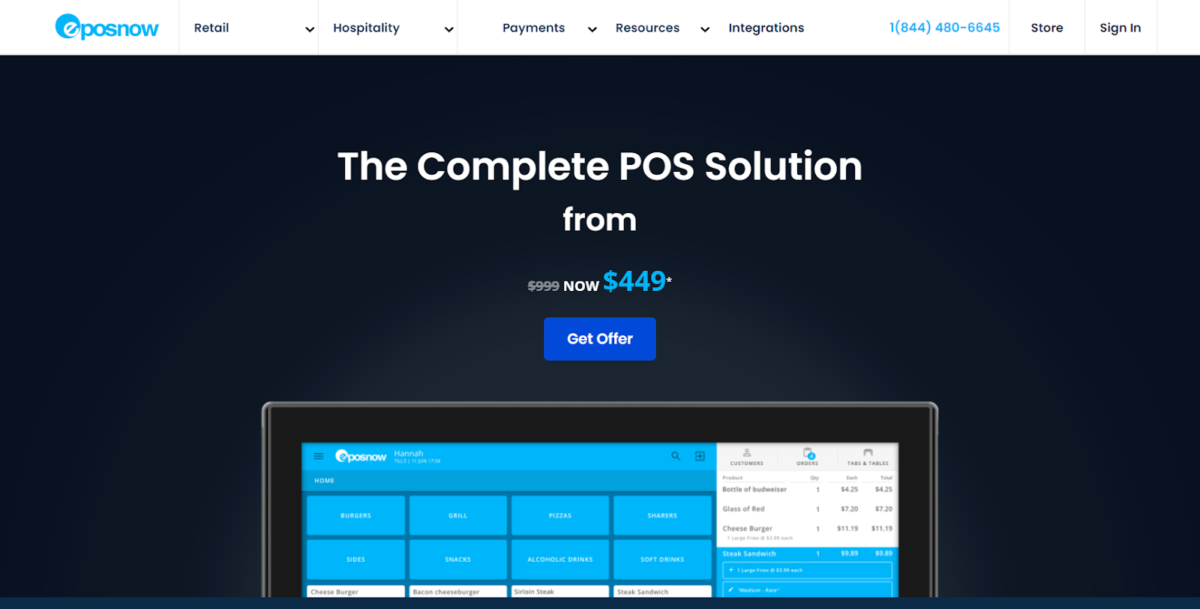
Eposnow is a very powerful point-of-sale system that is affordable for small businesses. If you are small but want to grow big and need a robust point-of-sale system, this might be the best choice for you. It is highly compatible with third-party hardware and integrates well across systems so it should be able to scale with you.
You can use this retail management software on multiple devices throughout your system, including Mac, PCS, and both Android and iPad tablets. All plans come with unlimited users and transactions. You’ll pay by the register, making this a great choice for smaller retailers who conduct most of their business through one register. You can upgrade your plan if you ever need to add an additional register.
Real-time sales data is available on the dashboard. It’s easy to see which products and selling well and which aren’t. Customer data is automatically collected as well.
Eposnow Pros
- Very robust sale software with affordable scaled pricing by the register.
- Works on a wide variety of devices with excellent integration so all your employees can use it without any trouble.
- Superb data collection and reporting with real-time sales information
- Excellent for complex inventories, able to support as many as 60,000 items and available management tools like wireless barcode scanners. Track things at the item level with real-time tracking.
Eposnow Cons
- By-register payment gets expensive quickly for medium and large or size businesses.
- Some features may be useless and confusing for smaller businesses that don’t need them.
What are the Most User-Friendly Point-of-Sale Software Solutions for Retail Businesses?
Square POS
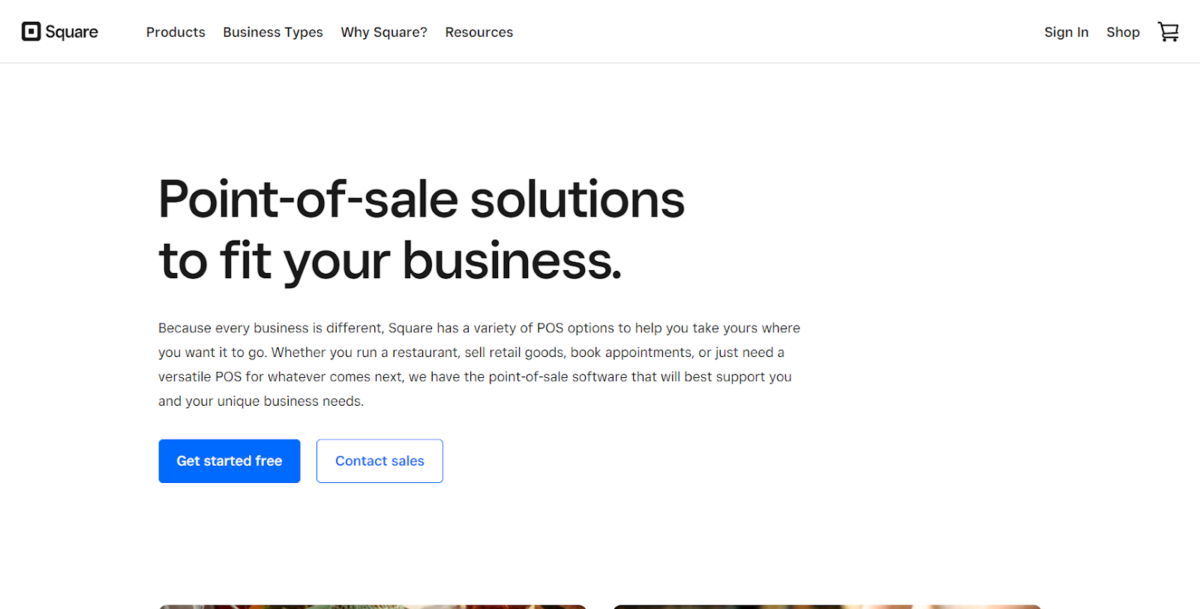
Square POS is affordable and easy to use. Square is so easy to use that it is a great choice for micro-businesses. With simple and reasonable flat pricing, you can easily organize your point-of-sale around Square. There are simple hardware options, from basic card readers to more extensive customer displays like Square Register. One of the primary benefits is that non-tech users can use it immediately. It provides accurate insights to guide your business.
Customer support is widely available, so you can get the help you need quickly if you run into any issues. It has excellent hardware and is compatible with both Android and iOS systems. You can freeze the account if there’s any evidence of fraudulent activity.
Square operates on a simple 2.75% transaction fee. This is affordable for small and mid-sized retail, but other options may be cheaper if your business is getting large. There is custom pricing for merchants with sales up to $250,000 per year, but it may not be as good an option for larger businesses, as the transaction costs can quickly add up, meaning you spend thousands of dollars more than you need to.
Square Pros
- A predictable payment schedule that is affordable for most smaller businesses with an affordable payment processing rate
- An easy-to-use option for even the smallest of businesses
- Able to scale with you from very small to mid-sized retail
- Great functionality for brick-and-mortar retail software solutions and ecommerce options
Square Cons
- Doesn’t handle inventory management, so you’ll have to have another program for inventory.
- Price does not scale well for larger businesses, so if your retail grows you may need to switch programs.
Clover
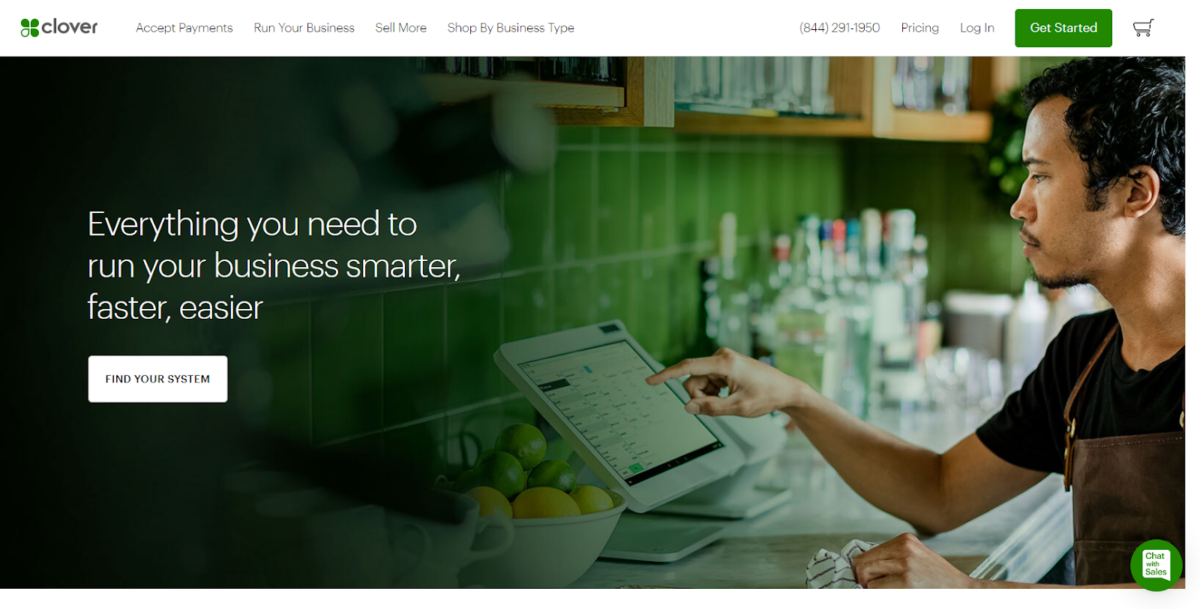
If you want to set up your point-of-sale and get back to business fast, Clover is an excellent option. This is one of the easiest systems to set up and learn.
There are many options for integrating hardware and software so you can customize your business’s needs without a lot of confusion. It’s very simple on its own, which means you won’t be cluttered with many excess tools you don’t need. Just purchase additional apps as you need them.
This is one of the best compromises between a potentially feature-rich program that is also extremely simple.
Clover offers two pricing plans:
- Register Lite: $14/month
- Register Plan: $29/month
Clover offers an array of hardware configurations, each providing the essential hardware you need to accept payments, so you can build a customer terminal based on what you need.
Clover Go POS includes a magstripe reader and a micro USB charging cable for basic needs, so you can email receipts to your customers.
Clover Flex POS includes a high-resolution 5-inch touch screen display, screwdriver, power brick, power cord, receipt paper, and charging cradle.
It includes a branded hand-held terminal you can carry with you to use anywhere.
The Clover Mini POS includes a high-resolution 7-inch touch screen display, everything with the Flex POS, with an ethernet cable, USB cable, two rolls of receipt paper, and an all-in-one table with a receipt printer and a credit card reader.
The Clover Station includes everything the Mini has, except it, has a 14-inch display, a connected receipt printer, and a connectivity hub.
Clover Pros
- Extremely simple to use and set up, with a bare and straightforward toolset.
- Build tools as you need them for your varying range of retail requirements.
- Highly customizable and powerful customer and employee management tools. Set up different employee permissions, use it as an employee time clock, and more.
- Keeps track of your inventory, and offers in-depth detailed reports.
- Easy hardware installation
- Accept on-screen signatures
Clover Cons
- One of the more expensive options on the market, especially if you’re just starting.
- Doesn’t have the best reputation for customer service.
What Are The Best-Reviewed, Most Powerful Point-of-Sale Software Solutions For Retail Businesses?
Quickbooks
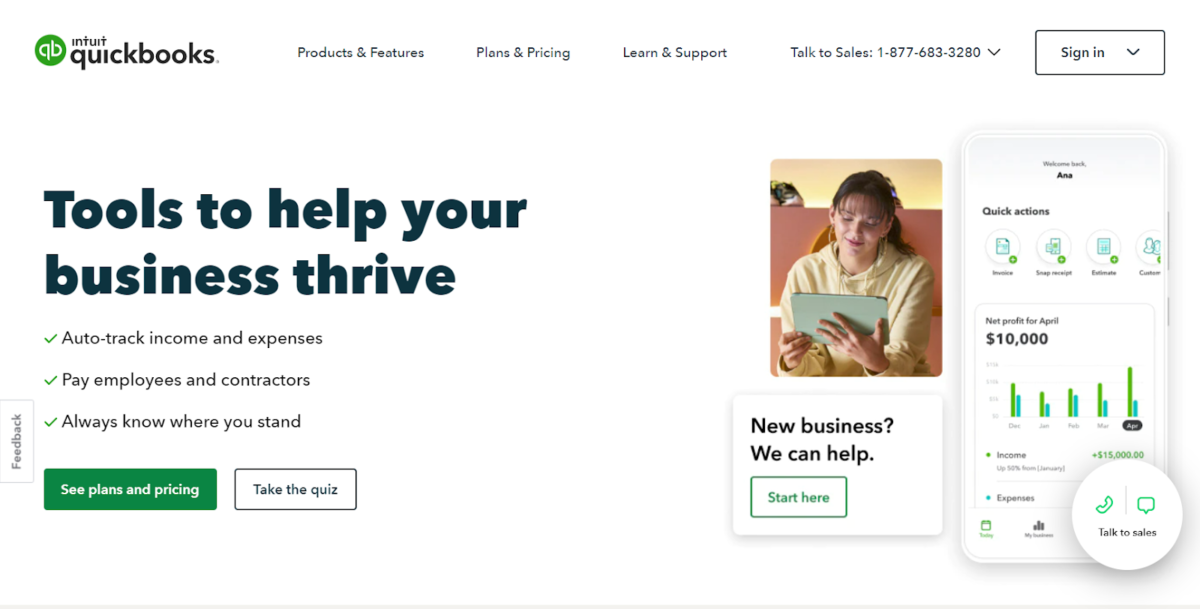
Quickbooks is well-known for all kinds of small business accounting, so it should be no surprise that it also has a powerful point-of-sale system. Integration with your bookkeeping is effortless when you use QuickBooks for POS.
The price is considerable, but QuickBooks can do a lot for you. As you grow, QuickBooks can keep up. The one-time fee means you can make your investment and not worry about maintaining a monthly subscription afterward. A free trial lets you consider your options for a month before committing. Payment plans are available to spread out the investment.
You can do all of your accounting, and credit card processing, create highly useful reports, keep track of your inventory, and track sales using this intuitive retail management software. Added advantages like offering discounts, gift receipts, and managing cash make QuickBooks one of the most feature-rich POS solution systems available. Add products to a sale through barcode scanning, to make the checkout process as fast and efficient as possible.
You can deploy the Quickbooks retail POS as a web-based system, an on-premise software (QuickBooks Desktop), or with the mobile app. The bookkeeping software solution works with a vast range of equipment including a pole display, wireless barcode scanners, a complete cash register, and more. It also supports a range of card processors.
There are three plans to choose from – the Basic Plan, Pro Plan, or Multi-Store. The basic version handles basic reports, payment processing, customer discounts, basic customer management and customer data tracking, and inventory tracking. The Pro and Multi-Store pricing plans add more features, such as granular display, commission management, employee management, sales management, and custom inventory controls.
QuickBook Pros
- An extremely powerful program that can handle all of your accounting, transactions, and point of sale integration in one beautifully integrated solution for a seamless experience.
- The Pro Plan lets you track all kinds of vendors and employee hours, and customize it to your needs, so there is plenty of room to grow with Quickbooks POS. The Pro Plan supports mailing list creation for email marketing campaigns, making handling essential business management capabilities easier.
- A one-time fee may be easier to manage in your business finances than a monthly subscription since you can handle the upfront costs with an extended payment plan.
- Licensing keeps it competitive for larger and smaller companies.
- Dedicated support team
QuickBooks Cons
- Does not have good mobile options or app integration.
- Doesn’t offer customer-facing displays
Vend
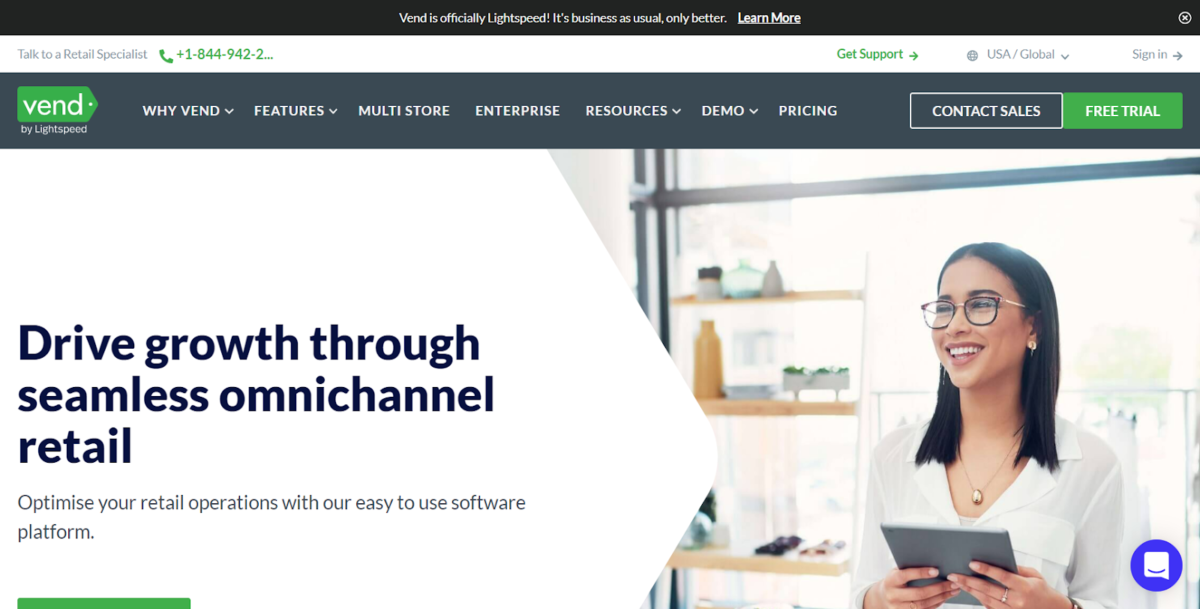
Vend offers a very robust option for small to medium-sized businesses at a straightforward monthly pricing scale. It is an excellent option for retail because of its powerful inventory management options.
Vend also offers a great mobile POS feature that will come in handy if you don’t want to conduct all of your business at a register. However, there may be some extra costs for some mobile device support options.
If you want to know what is going on with your sales activity monthly, weekly, and even daily, this might be the best choice. The cloud-based system gives you perfect coordination no matter what platform you use.
Vend Pros
- In-depth metrics on customer behavior.
- Excellent inventory tracking.
- Easy-to-use system for medium and small businesses
- Two-week free trial period so you can determine whether it’ll work well.
- Save money with annual billing
Vend Cons
- No server-based option
- Mobile sales are limited to the iPad – no other point-of-sale hardware is available for retail systems
- Partners with third-party for credit card transactions
Revel Systems Retail POS System
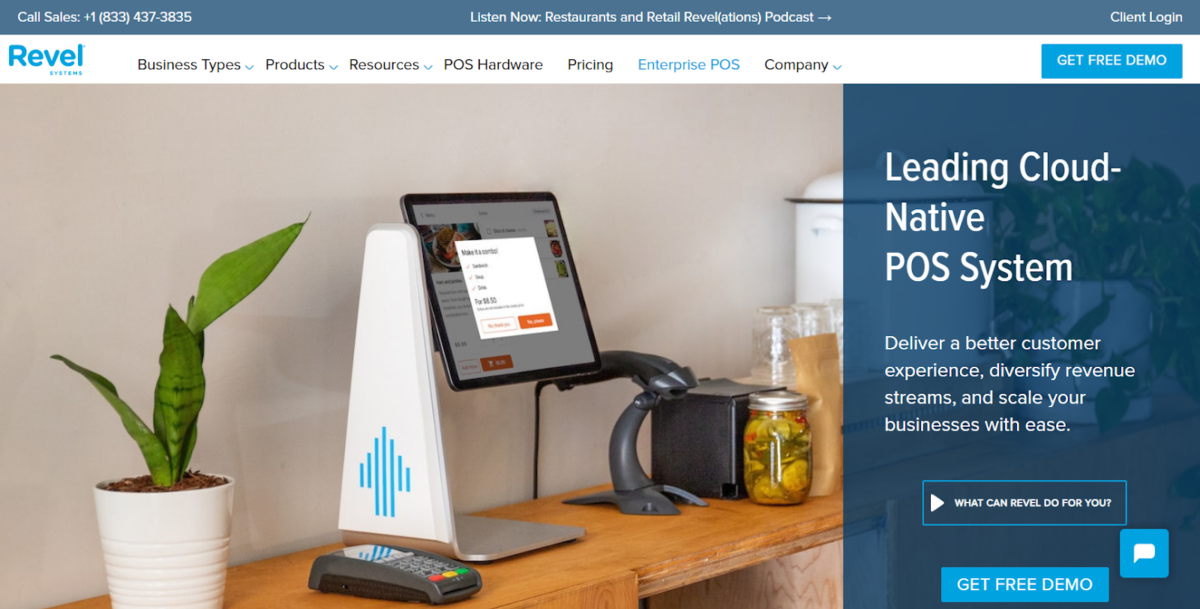
If you want many features for your specific type of retail, Revel might have what you need. Revel is a point-of-sale system targeted toward small businesses with specific needs. It can handle a range of industries and comes with free automatic product updates. If your particular business is in one of their target groups, you may not mind paying a slightly higher price tag for the awesome features available.
It also includes a restaurant POS, which has built-in functionalities for kitchen management, making it a great choice for food trucks. You can use it to offer a variety of customers discounts, such as happy hour discounts, dollar-off discounts, group discounts, and your standard percentage discounts.
This program provides retailers with many tools right from the register, so if managing your small retail store is a tough one-man job, Revel might make it much easier. Convenience features like fast cash on hand can get you out of a tough spot. Revel handles its own credit card processing, but you can integrate it with several different processors if you would rather. It works with various equipment such as scales, cash drawers, printers, and even diagnostic devices.
You can view your customers’ profiles, enter additional details such as card details, extra details, import lists from other sources, and store email addresses for future email marketing. You can use the customer display and additional screens to run advertising offers to shoppers.
Revel Systems Pros
- Highly customizable to your particular type of retail needs, with valuable insights.
- Feature-packed with many tools available from the register.
- In-house credit card processing is available but also integrates with other systems, so you can choose your favorite payment processor.
- Easy-to-use interface despite being highly specialized.
- Excellent customer service offered.
Revel Systems Cons
- Prices are hard to figure out and tend to be quite expensive with some hidden fees
- No opportunity for a free trial.
- Not useful if it doesn’t cover your particular area of retail.
Wrapping Up
There is no shortage of options for retail POS systems, making the decision about which one to use hard for many retailers. You’re not alone if you’re struggling to get the ball rolling. This systems list is designed to help you find what will work best for you.
We’ve found that Square POS is the simplest platform for micro-businesses since it is affordable and easy to set up. For Shopify users, the Shopify POS is an ideal solution, since it integrates seamlessly.
For medium-to-large ecommerce stores that also have multiple physical store locations, we recommend either ShopKeep or Esposnow. Shopkeep allows for up to 20 retail locations, while Esposnow allows for by-the-register billing.
No matter what products you sell, or the size of your catalog, the right POS system makes all the difference in how smoothly you can operate your business. Spend time evaluating features like inventory management tools, customer relationship management tools, and costs such as the monthly fee and processing fees before making your final choice.







![13 Best YouTube to MP3 Converters [Free & Easy to Use]](https://thegateway.net.au/wp-content/uploads/2021/12/13-best-youtube-to-mp3-converters-free-easy-to-use-768x403.png)